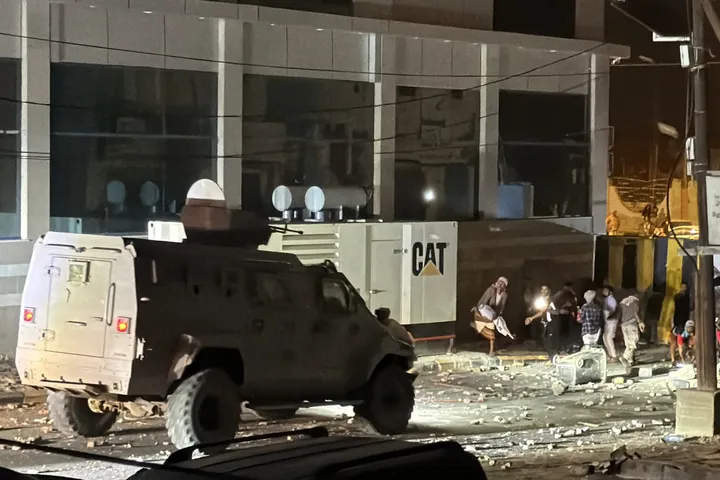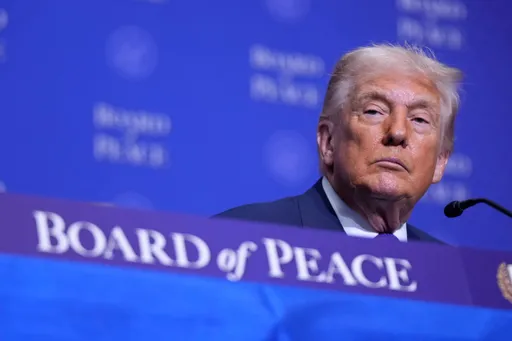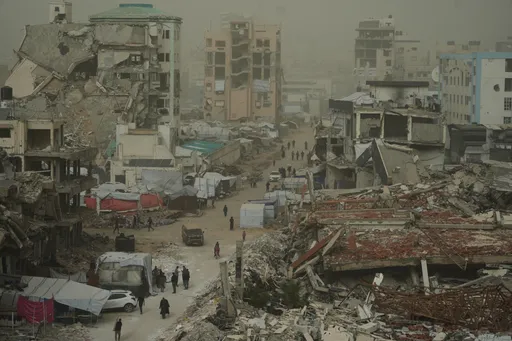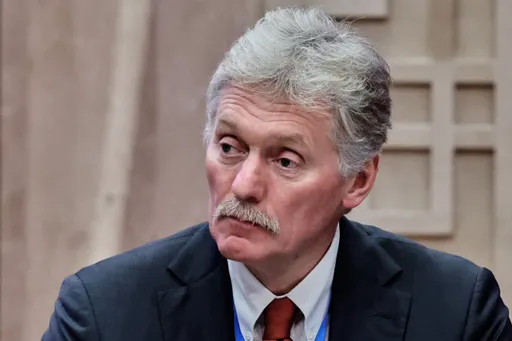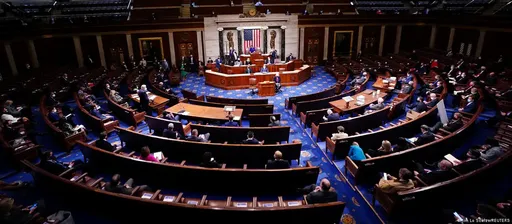Reaching Afrin is difficult for those escaping Russian and regime attacks in southern Idlib. But those who are already there are relatively safer. Markets are filled with people, especially children, who are not afraid of looming aerial assaults but are still scarred by the violence they have witnessed over the past several years.
Driving through the cities, towns, and villages it was clear that they had survived war. It seemed as if there wasn’t a wall or road untouched by the effects of explosions and gunfire.
Even in neighbourhoods filled with life, it’s not uncommon to find a completely destroyed building reduced to a pile of rubble. The owners of such buildings may have left or the locals are unable to clear the rubble on their own.
On closer inspection, a number of problems emerge. Take Yusuf al Azmeh elementary school in the district. It is a run-down facility with a courtyard full of children playing in the unkempt grass and weeds.
One child TRT World spoke to expressed his frustration that the school was not big enough and that there wasn’t any good food to eat.
Principal Hamdi Obeid said at least 1,000 students attend the school.
"But we don’t have enough classrooms, chairs or teachers,” he added.
Obeid continued explaining the challenges they face and why they continue to do the work they do: “If we didn’t hold classes the children would be running out in the streets, and some of them wouldn’t even be able to get a meal at home,” he said.
The territories controlled by Turkey-backed Syrian opposition forces are slowly but surely enjoying restive safety and security. However, they are in need of increased support so that they can rebuild the destruction left behind by intermittent fighting between opposition forces and various terror outfits.
People in northern Syria are at peace with the Turkish presence but are concerned that it won’t last forever.
Despite the uncertain fate of northern Syria, civilians in Idlib are flocking to the Turkish border because they’re no longer safe from Russian and regime attacks in southern Idlib and northern Hama.
Thousands of people are packing what belongings they can, along with their families, and taking their cars and trucks north.
Wherever they can find a place to stop for a rest or even to pitch a tent, they aren’t passing up the chance.
At Deir Ballout - Atmeh checkpoint in Jinderes, west of Afrin, people on a recent Monday morning were visibly exhausted. Speaking to them was difficult because they were frustrated at how hard it was to cross into Turkey-backed opposition territories.
Abu Ahmad, who had his children packed into a pickup truck with some personal belongings, was desperate to send his family to Afrin. “I have nothing left and I need to go somewhere where my children are safe and I can try to build my life from scratch. I don’t care if I have to live under the trees. I just want to get as far away from the shelling as possible,” he said.
To understand why people are fleeing, how they are getting to the north, and what they’re doing when they get there, TRT World visited Idlib province.
As we entered Bab al Hawa and the Atmeh Camp, it felt like entering a busy cosmopolitan city. Trucks carrying products for sale and cars zooming around to and from the border.
However, this part of Syria stands out from other places in the north because everywhere you look you find people living under trees and in tents.
Northern Idlib has become a destination of choice for the 3.7 million people living in the province. Especially after the regime and Russia started their escalation on southern Idlib and northern Hama provinces.
That escalation had been going on for 10 days by the time time we arrived. By then tens of thousands of people had already arrived.
To see them we had to drive through the Atmeh refugee camp.
Driving toward it was overwhelming - it seemed like it didn’t end. Every hill you ascend, you see another hilltop covered in tents and makeshift shelters. As you get closer, the air starts to get thicker due to the dust kicked up by the more than one million people living in the camp. A single main road is the only way into the camp. A one way road with two way traffic.
On either side, the road is flanked by businesses of all sorts. Some sell food, others clothes, electronics and fuel. Even barbers and women hair stylists have set up their kiosks along the way.
Each family had taken a tree and spread a blanket on the ground to sit on. Some didn’t have blankets and sat under their tree in the dirt.
Some families looked more distraught than others. The children were mostly barefoot and looked as if they had not changed their clothes or bathed in days. Everyone we spoke with had already spent more than several nights in the open.
This scene was repeated at the next olive grove we stopped at. However, the next one had over 250 families living without shelter under the trees. And the number of children was significantly more. Dozens if not hundreds of children as far as the eye could see. The dense trees blocked our view but everyone we spoke with told us if you go deeper into the olive grove you would find more people and even more desperation.
When we asked a man who had escaped with his family what it was like in southern Idlib and told him we wanted to go down there and see what it was like, he replied: “It’s world war three down there. I wouldn’t go there if I were you. That’s why we’re here sitting under the trees in the middle of Ramadan. It’s no way to live a life. Especially for innocent children who didn’t do anything to Assad or Putin.”
Regime and Russian attacks on Idlib have been focused on areas in the south of the province and opposition forces suggest that the offensive aims to take control of the M4-M5 highway system. We had to find out more. So we went to the town where the two highways meet in Saraqib. The M5 connects the Turkish border with Jordan and the M4 connects Lattakia with Aleppo, going all the way down to Deir Ezzor. These are major commercial routes that both the opposition and the regime would like to control.
Getting there was a long drive but it seemed that time slowed down in Saraqib. It’s been turned into a ghost town due to years of regime attacks. Not a single building was left untouched. And the few people that we saw in Saraqib walked as if they were dragging heavy weights behind them. We stopped on the highway next to Saraqib to watch the traffic. No speed limits and no remnants of state authority mean the people can drive at high speeds. Most are probably trying to avoid being caught in the line of fire. Locals told us that at night regime aircraft monitor the highway and just the night before had attacked vehicles who left their lights on with heavy machine gun fire.
On another day we decided to go deeper south into Idlib province to visit a hospital taken out of service during the recent escalation. This time we went around Atmeh camp and drove through Kafraya and Foua, then Idlib City, Saraqib, Maarat al Numan, and many other smaller towns and villages until we reached Kafranbel Surgical Hospital.
At the hospital we found a completely collapsed building that used to be a cultural centre before the war. When fighting started, activists and NGOs turned the building into a hospital. What’s left of it now is twisted metal, rubble, dust-covered supplies and broken equipment. It was not surprising since on the way there nearly every other building was reduced to rubble. Locals seemed accustomed to the hardship, with the few we saw simply going about their business.
While standing in the hospital, fighter jets started flying above our heads. The hospital staff were visibly concerned and wanted to leave as soon as possible. They said the hospital was a target and our cars were probably spotted. We had to get out. As we were finishing our interview with the hospital administrator we heard the first attack. That’s when everyone got very serious and told us we had to leave.
We got in the car and followed a local activist to what we thought was his house. Instead he sped through the narrow streets of Kafranbel towards the plume of smoke that climbed up into the clear blue sky.
We arrived at the corner of a civilian neighbourhood only to find many more people than we thought still living in their homes. Some were standing outside their doors looking up towards the sky waiting for the second attack. The regime uses a double tap strategy in aerial attacks to ensure maximum damage.
As the sound of jets grew more intense and it was obvious that there was more than one in the sky above some people started making a mad dash for safety. Suddenly the jet sounded like it was just above our heads and a piercing explosion filled the air.
The vibrations of that explosion filled my lungs as if I had taken a blow to the chest leaving me breathless. The next thing I remember was explaining to the camera where we were and what was happening as a woman in her black dress ran furiously in the other direction carrying her infant child. Then two brothers wearing the exact same clothes, the older one with his arm around the younger one, came running towards us from the scene of the attack. The fear in their eyes was crisp and fresh like the morning dew on the leaves of olive trees after a chilly spring night.
We got back in the car and drove towards the scene of the attack. A White Helmets Civil Defence centre was engulfed in flames and a chaotic rescue scene was playing out before our eyes. It was as if I had been watching a video from social media about regime attacks on civilian neighbourhoods. But this wasn’t a video, or a false flag attack like some would suggest, but instead, a brutal assault meant to instil fear and panic in the hearts and minds of civilians who just want to live their lives in peace with freedom, dignity and honour.
TRT World journalists Faruk Yuce, Hasan Arber and Gokhan Gokce contributed to this article.

